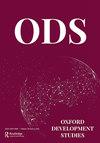透明度、排斥和调解:数字和生物识别技术如何改变印度泰米尔纳德邦的社会保护
IF 1.2
Q3 DEVELOPMENT STUDIES
引用次数: 8
摘要
摘要生物识别和数字技术对印度穷人的社会保护有什么影响?本文借鉴泰米尔纳德邦农村的人种学研究,提供了公共分配系统(PDS)受益者如何体验新技术的证据,并分析了技术创新对透明度、排斥和调解的影响。作者专注于“智能卡”的实施,这是一种新的数字化和Aadhaar功能的配给卡,于2017年在泰米尔纳德邦各地的配给店推出。他们首先记录了数字化智能卡和移动短信如何通过引入新的不透明性和信息缺口来改变受益人的透明度。然后,他们展示了缺乏透明度如何(重新)产生各种形式的排斥,这些排斥在自动化PDS下仍然是一个挑战。最后,本文强调了新型亲属和非亲属调解如何在获得PDS方面发挥缓解作用,并构成社会福利提供基础设施的重要组成部分。本文章由计算机程序翻译,如有差异,请以英文原文为准。
Transparency, exclusion and mediation: how digital and biometric technologies are transforming social protection in Tamil Nadu, India
ABSTRACT What are the effects of biometric and digital technologies on social protection for the poor in India? Drawing on ethnographic research from rural Tamil Nadu, this paper presents evidence of how new technologies are experienced by beneficiaries of the Public Distribution System (PDS), and analyses the impacts of technology innovations on transparency, exclusion and mediation. The authors focus on the implementation of ‘smartcards,’ new digitised and Aadhaar-enabled ration cards, introduced in ration shops across Tamil Nadu in 2017. They first document how digitised smartcards and mobile text messages transform transparency for beneficiaries by introducing new opacities and information gaps. They then demonstrate how a lack of transparency (re)produces forms of exclusion that remain a challenge under the automated PDS. Finally, the paper highlights how novel forms of kin and non-kin mediation play a mitigating role in accessing PDS, and constitute a vital part of the infrastructure underpinning social welfare delivery.
求助全文
通过发布文献求助,成功后即可免费获取论文全文。
去求助
来源期刊

Oxford Development Studies
DEVELOPMENT STUDIES-
CiteScore
2.70
自引率
0.00%
发文量
20
期刊介绍:
Oxford Development Studies is a multidisciplinary academic journal aimed at the student, research and policy-making community, which provides a forum for rigorous and critical analysis of conventional theories and policy issues in all aspects of development, and aims to contribute to new approaches. It covers a number of disciplines related to development, including economics, history, politics, anthropology and sociology, and will publish quantitative papers as well as surveys of literature.
 求助内容:
求助内容: 应助结果提醒方式:
应助结果提醒方式:


